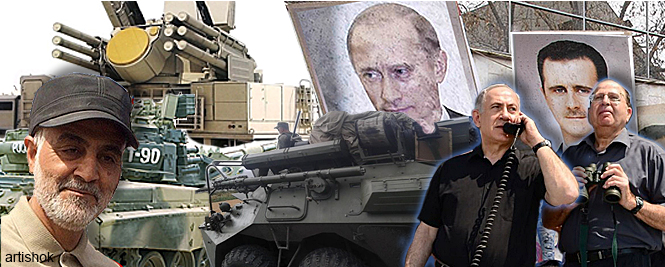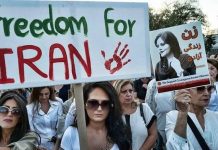Analysis: Who Will Russia Back in the Next Lebanon War: Israel or Hezbollah?
بجانب من ستكون روسيا في حرب لبنان القادمة بين اسرائيل وحزب الله
Amos Harel/Haaretz//October 15/17
If there is one thing that characterizes Russian policy, it is its utter cynicism. It’s possible the Russians will actually conclude that mutual bloodletting is in their interests if a new war erupts between Israel and Hezbollah.
It seems that some anxiety about future events can be found between the lines of Defense Minister Avigdor Lieberman’s recent remarks about fighting the next war on two fronts. American support is not what it was, even if the United States did announce Thursday it was quitting UNESCO over the UN organization’s “anti-Israel bias.”
The Obama administration had already begun turning its attention from the Near East to the Far East. President Donald Trump is mainly busy with his desire to declare himself the great conqueror of the Islamic State group. The extent of his commitment to restricting Iran’s power is unclear – and seemingly depends on the way he can present himself as doing the opposite of his predecessor in the White House.
In the vacuum that has been created in the region, Iran is maneuvering better than any other player.
Will Israel be able to depend on the Russians? Prime Minister Benjamin Netanyahu navigated the talks with President Vladimir Putin very wisely and apparently achieved Russian agreement not to interfere in Israel’s ongoing campaign to keep Hezbollah from receiving advanced Iranian weapons.
But the bigger questions are how Moscow will act in the long term in response to expanded Iranian influence, and whether it will intervene in a possible clash between Israel and Hezbollah.
The Americans and Europeans are far from spotless, but if there is one thing that characterizes Russian policy, it is its utter cynicism. It is possible that, under such circumstances, the Russians will actually conclude that mutual bloodletting is in their interests.
Dr. Dmitry Adamsky of the Interdisciplinary Center, Herzliya, is one of Israel’s outstanding experts on Russian strategic thinking. In an article published last week in the magazine Foreign Affairs, Adamsky stated that the Kremlin will want to take advantage of a future war between Israel and Hezbollah to continue to strengthen Russia’s position in the Middle East.
According to Adamsky, the stabilization that has begun in the Assad regime, with Russian and Iranian assistance, has increased the competition for influence in Syria between the two patrons and that they will find it difficult to live together harmoniously for long. Adamsky believes Iran’s aspirations are becoming a problem for Russia, which wants to restrict it without a head-on clash.
Adamsky suggests that in a future war, Russia will want to allow Iran and Hezbollah to keep bleeding so as to weaken them. However, Adamsky predicts that if a resounding Israeli victory is on the horizon, Russia will intervene to rein it in, because it needs Hezbollah as part of its arc of regional influence – and it especially needs Hezbollah forces in Syria. A crushing defeat of Hezbollah by Israel could dismantle the existing balance of power in Lebanon and badly affect the Assad regime.
Russia also has an interest in showing the Israelis the limits of their own power.
Adamsky believes the preferred outcome for Moscow will be a short war in Lebanon, in which, before it ends, Russia will step in as intermediary. At the end of the Second Lebanon War in 2006, the Russians were completely absent from the talks, leaving them to the Americans and French.
Adamsky believes that in order to protect Hezbollah from defeat, Russia will consider a calculated cyberwar without leaving clear traces of its responsibility, which would disrupt ports and oil refineries in Israel. The Russians have already used similar techniques in times of tensions with Ukraine, the Baltic states and Turkey. The Russians can also deploy an aerial umbrella around essential sites to Hezbollah and Iran, and even use electronic warfare to disrupt an Israeli attack.
These are new circumstances, of which Israeli warfare planners are fully aware. It’s not going to be easy.
War on two fronts becomes double bind for Israel
Lieberman took advantage of the festive atmosphere to spread some light and optimism to Israel’s citizens in his own inimitable style. At a meeting with outstanding soldiers in his sukkah, Lieberman said the following: “The next war,” of which he spoke with almost total resignation, “will be waged on two fronts – the north and south.”
The south front will be against Hamas in Gaza. And the north – from the Lebanese border to Syria – will be one big front. War with Hezbollah will mean war with President Bashar Assad’s regime in Syria and the Lebanese army, which in any case has already become “an integral part of Hezbollah, under its command.”
Israel is trying to prevent a war, but the words “low probability” are irrelevant given the region’s new circumstances, whereby war can break out from one day to the next, without warning.
Lieberman’s views on our enemies’ intentions are well-known, as is his determination to keep the Israel Defense Forces on a high state of readiness. But is the military ready for the scenario of fighting on two fronts, as Lieberman describes? And what are the politicians doing to ensure the IDF will be ready for any developments it may face?
These things were discussed and alluded to in the report by the Knesset Foreign Affairs and Defense Subcommittee on Building Defense Strategy and Power, which was published at the end of last month. In its public, nonclassified version, the report by the committee, headed by MK Ofer Shelah (Yesh Atid), states that during the last military campaigns Israel waged – in Lebanon and Gaza – the use of weapons, vehicles and spare parts exceeded the IDF’s original calculations by hundreds of percentage points.
The committee noted that the concept of military planning regarding army requirements during times of combat was “bankrupt” in the face of the realities of battle.
The committee recommended a fundamental change to the military planning process and a reexamination of the assessments the IDF has made of threats and vulnerabilities in its preparations for battle.
Under the current circumstances, “The IDF has no real criteria with regard to its endurance in the battlefield, or the urgency and prioritization of various supply needs,” the committee said, adding that “in terms of required human resources, a scenario must be examined of fighting on two parallel fronts – because it is clear that the same unit cannot be used in two arenas simultaneously and such a scenario stretches the IDF’s capabilities to full capacity.”
The committee concluded that the scenario the army should be considering is fighting on one front after another, “which is the most difficult of all possibilities.”
In other words, Lieberman is apparently presenting a reasonable prediction of what could happen if another war breaks out. But serious questions arise from the nonclassified version of the Shelah committee report about whether the army is preparing properly for this possibility
https://www.haaretz.com/middle-east-news/1.817041





















